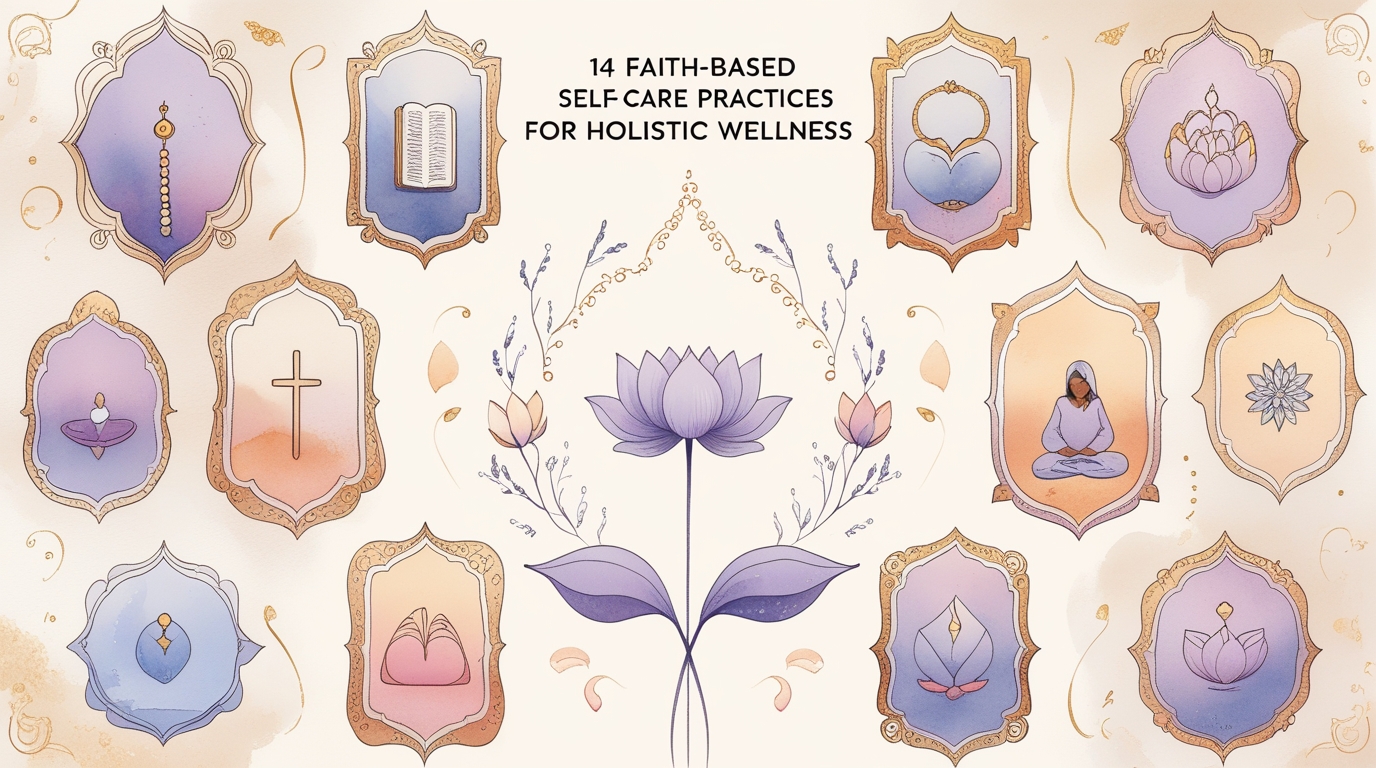In today’s busy world, taking time to care for yourself is essential—not only for your physical and emotional well-being, but also for your spiritual growth. For Christians, self-care goes beyond bubble baths and spa days. It’s about nurturing your soul, reconnecting with God, and finding balance in every aspect of your life. In this article, we explore 14 faith-based self-care practices designed to help you grow in holistic wellness and live out your calling in Christ.
Whether you’re feeling overwhelmed by work and family or simply seeking a deeper sense of peace, these practices can serve as a blueprint for transforming your daily routine into a pathway of rest, reflection, and renewal.
1. Prayer and Meditation
Overview:
Prayer is the cornerstone of the Christian life. Setting aside dedicated time to pray and meditate on Scripture can calm your mind, refocus your heart, and help you stay connected with God.
How to Practice:
- Daily Quiet Time: Begin and end your day with prayer. Use guided prayer or Scripture meditation to center yourself.
- Scripture Meditation: Choose a verse (e.g., Psalm 46:10, “Be still, and know that I am God”) and repeat it during quiet moments.
- Prayer Journaling: Write down your prayers and reflections to track spiritual growth over time.
Benefits:
- Deepens your relationship with God
- Provides clarity and calm during stressful times
- Encourages a habit of mindfulness and gratitude
2. Sabbath Rest
Overview:
The biblical Sabbath is a time for rest and renewal. In a culture that never seems to stop, deliberately setting aside time for rest can recharge your spirit and restore balance.
How to Practice:
- Weekly Sabbath: Choose one day a week to unplug from work and technology, focusing solely on rest and spiritual nourishment.
- Nature Walks: Spend quiet time outdoors during your Sabbath to reflect on God’s creation.
- Family Worship: Use this day to gather with family for a worship session or Bible study.
Biblical Inspiration:
Exodus 20:8-10 reminds us to “Remember the Sabbath day, to keep it holy,” reinforcing the importance of rest.
Benefits:
- Promotes mental and physical rejuvenation
- Encourages quality time with family
- Strengthens your trust in God’s provision
3. Fasting for Spiritual Clarity
Overview:
Fasting is a powerful discipline that has been practiced by believers for centuries. It creates space for spiritual reflection, prayer, and a deeper reliance on God.
How to Practice:
- Partial Fasts: Skip one meal or reduce your food intake for a set period.
- Digital Fast: Consider fasting from social media or digital distractions to focus on God’s voice.
- Group Fasting: Join your church or community in a fasting challenge to foster unity and accountability.
Biblical Inspiration:
Matthew 6:16-18 offers guidance on fasting with the right heart, encouraging believers to fast in secret and with humility.
Benefits:
- Enhances spiritual discernment
- Creates a heightened awareness of God’s presence
- Helps reset priorities away from worldly distractions
4. Gratitude Journaling
Overview:
Gratitude is a transformative practice that shifts your focus from what you lack to the abundance in your life. Keeping a gratitude journal helps remind you of God’s blessings every day.
How to Practice:
- Daily Entries: Write down three things you’re grateful for each day.
- Scriptural Integration: Include Bible verses that speak to God’s faithfulness (e.g., 1 Thessalonians 5:18).
- Reflect and Pray: Use your journal as a starting point for prayer and reflection.
Benefits:
- Cultivates a positive mindset
- Increases overall satisfaction and joy
- Deepens your trust in God’s ongoing provision
5. Digital Detox
Overview:
In our hyper-connected world, constant digital noise can lead to anxiety and distraction. A digital detox helps you reclaim your time and mental space for what truly matters.
How to Practice:
- Set Boundaries: Establish “tech-free” hours, especially during meals and before bedtime.
- Unplug Regularly: Designate one day a week or specific times to disconnect from devices.
- Mindful Consumption: Evaluate the content you consume—choose uplifting, faith-based media over negative news or mindless scrolling.
Biblical Inspiration:
Psalm 46:10, “Be still, and know that I am God,” serves as a reminder to find quiet in the midst of constant activity.
Benefits:
- Reduces stress and improves sleep
- Enhances focus on prayer, reading, and personal reflection
- Fosters deeper connections with family and community
6. Nature Walks and Outdoor Reflection
Overview:
Spending time in nature not only benefits your physical health but also offers a profound spiritual experience. Nature reminds us of God’s creativity and majesty.
How to Practice:
- Weekly Walks: Set aside time each week to walk in a nearby park or nature reserve.
- Prayer in Nature: Use these walks as an opportunity for spontaneous prayer and meditation.
- Photography and Reflection: Capture moments of beauty to remind you of God’s artistry.
Biblical Inspiration:
Romans 1:20 teaches that God’s invisible qualities are evident in creation, making nature a powerful reminder of His glory.
Benefits:
- Enhances physical health through exercise
- Reduces stress and promotes mental clarity
- Strengthens your sense of connection with God’s creation
7. Worship and Music Meditation
Overview:
Music has a unique way of lifting the spirit. Worship and music meditation allow you to enter into a time of praise, relaxation, and spiritual connection.
How to Practice:
- Create a Worship Playlist: Compile your favorite worship songs and listen during your downtime.
- Attend Live Worship: Participate in local worship nights or concerts.
- Music and Meditation: Sit in quiet reflection with instrumental worship music, allowing the melodies to guide your prayer time.
Biblical Inspiration:
Psalm 95:1-2 invites us to “Come, let us sing for joy to the Lord; let us shout aloud to the Rock of our salvation,” celebrating the power of music in worship.
Benefits:
- Lifts the mood and inspires joy
- Deepens your emotional and spiritual connection to God
- Provides a creative outlet for expressing gratitude and praise
8. Mindful Breathing and Relaxation Techniques
Overview:
Mindful breathing is a simple yet powerful tool to calm the mind and center your thoughts. Integrating this practice with prayer can be an effective way to reduce stress and focus on God’s presence.
How to Practice:
- Daily Breathing Exercises: Practice deep breathing for five minutes each morning.
- Incorporate Scripture: Pair your breathing with silent meditation on a Bible verse.
- Use Guided Meditations: Find faith-based meditation apps or recordings that incorporate Scripture.
Biblical Inspiration:
Philippians 4:6-7 reminds us to present our requests to God, and that His peace will guard our hearts and minds—an ideal complement to mindful breathing.
Benefits:
- Promotes relaxation and reduces anxiety
- Enhances focus and mental clarity
- Encourages a deeper connection with God through quiet reflection
9. Spiritual Direction and Accountability
Overview:
Spiritual direction involves partnering with a mentor or small group to help you discern God’s will. This practice can lead to significant personal growth and transformation.
How to Practice:
- Find a Spiritual Mentor: Seek out someone with wisdom and maturity in the faith who can offer guidance and accountability.
- Join a Small Group: Participate in a Bible study or accountability group that focuses on personal and spiritual growth.
- Regular Meetings: Set aside time each month for one-on-one or group sessions to reflect on your spiritual journey.
Biblical Inspiration:
Proverbs 27:17 states, “As iron sharpens iron, so one person sharpens another,” emphasizing the importance of accountability and mutual growth in the faith.
Benefits:
- Provides guidance and clarity in your spiritual walk
- Offers a safe space for honest reflection and prayer
- Encourages continual growth through supportive relationships
10. Fasting and Sabbatical Retreats
Overview:
Fasting and periodic retreats are long-standing spiritual disciplines that allow you to disconnect from routine and reconnect with God. These practices help you focus on what truly matters.
How to Practice:
- Plan Regular Fasts: Whether it’s a one-day or multi-day fast, dedicate time to abstain from food or digital distractions to focus on prayer.
- Organize Retreats: Plan a weekend retreat—alone or with a small group—to step away from daily pressures and immerse yourself in Scripture and prayer.
- Combine with Journaling: Document your thoughts, revelations, and prayers during these times for further reflection.
Biblical Inspiration:
Matthew 6:16-18 instructs believers to fast in secret and with humility, focusing on their relationship with God rather than external appearances.
Benefits:
- Deepens spiritual discipline and dependence on God
- Offers a break from the routine to gain fresh perspective
- Encourages introspection and long-term spiritual growth
11. Creative Expression: Art and Writing
Overview:
Creative expression through art, writing, or music can be a form of self-care that nurtures both your heart and soul. It offers a way to process emotions and express your faith in a personal and unique way.
How to Practice:
- Start a Faith Journal: Write down your thoughts, prayers, and reflections on Scripture.
- Engage in Artistic Activities: Try drawing, painting, or crafting with a focus on biblical themes.
- Write Poetry or Songs: Compose original pieces that celebrate God’s love and your spiritual journey.
Biblical Inspiration:
Exodus 31:3-5 speaks of God filling certain individuals with His Spirit, giving them skill, ability, and knowledge in all kinds of crafts—encouraging creative expression as a gift from God.
Benefits:
- Provides an emotional outlet and stress relief
- Encourages self-expression and personal insight
- Deepens your connection to God through creative worship
12. Community Service and Volunteering
Overview:
Serving others is a form of self-care that nurtures the soul and reinforces your identity in Christ. Volunteering can shift your focus from personal challenges to the joy of giving and making a difference.
How to Practice:
- Join Church Outreach Programs: Participate in local service projects, such as food drives or community clean-ups.
- Volunteer at Local Charities: Dedicate time to serving those in need, whether at a shelter, hospital, or community center.
- Lead a Service Initiative: If you feel called, start a new outreach program that meets a specific need in your community.
Biblical Inspiration:
Galatians 5:13 instructs believers to serve one another humbly in love, highlighting that service is a natural outpouring of faith.
Benefits:
- Fosters a sense of purpose and fulfillment
- Strengthens community bonds and builds lasting relationships
- Shifts focus from self to serving others, which is deeply restorative
13. Cultivating a Prayerful Home Environment
Overview:
Creating a home environment where prayer and worship are a natural part of daily life can serve as a constant reminder of God’s presence. This practice not only benefits you but also your family.
How to Practice:
- Set Up a Prayer Corner: Designate a space in your home where you can retreat for quiet prayer and Bible reading.
- Family Prayer Time: Establish regular prayer times with your family to share in worship and reflection.
- Incorporate Scripture in Daily Life: Place Bible verses in visible areas (e.g., your desk, mirror, or fridge) to encourage ongoing reflection.
Biblical Inspiration:
Colossians 3:16 instructs us to let the message of Christ dwell among us richly as we teach and admonish one another with all wisdom.
Benefits:
- Creates a peaceful, spiritually enriched atmosphere at home
- Encourages family unity and mutual encouragement in faith
- Provides daily reminders of God’s promises and truth
14. Setting Healthy Boundaries and Saying No
Overview:
An often-overlooked aspect of self-care is learning to set healthy boundaries. As you care for your physical and spiritual well-being, it’s essential to say “no” to activities and commitments that drain your energy and distract you from God’s purpose.
How to Practice:
- Evaluate Your Commitments: Regularly review your schedule and commitments. Identify what is essential and what can be delegated or eliminated.
- Learn to Say No: Practice politely declining requests that do not align with your values or that overextend your capacity.
- Schedule “Me” Time: Dedicate regular time solely for rest, reflection, and personal worship without distractions.
Biblical Inspiration:
Matthew 6:33 advises us to “seek first His kingdom and His righteousness,” reminding us that prioritizing our spiritual well-being should come before all else.
Benefits:
- Prevents burnout and stress
- Fosters a balanced lifestyle that prioritizes what truly matters
- Empowers you to live intentionally and free from overwhelm
Final Thoughts
Incorporating these 14 faith-based self-care practices into your daily life can transform the way you experience both personal wellness and your walk with God. When self-care is rooted in biblical principles, it becomes a powerful act of worship—a way of honoring the Creator by caring for the creation He has entrusted to you.
By embracing practices such as prayer, Sabbath rest, fasting, gratitude journaling, and setting healthy boundaries, you nurture not only your body and mind but also your soul. This holistic approach to wellness enables you to serve others more effectively and shine as a light in your community.
As you begin to implement these practices, remember that self-care is not selfish. It is an essential discipline that prepares you to love and serve both God and others with renewed energy and passion. Start small, remain consistent, and allow the transformative power of God’s grace to guide you every step of the way.
May these faith-based self-care practices enrich your life, restore your spirit, and deepen your connection with God. Embrace the journey toward holistic wellness, and let your life be a testament to the love, peace, and joy found in Christ.
Happy self-care, and may God bless you abundantly as you care for yourself in His name!
If you’d like more insights or further guidance on any of these practices, feel free to leave a comment or share your own experiences. Together, we can create a community that values rest, reflection, and the relentless pursuit of God’s truth.



